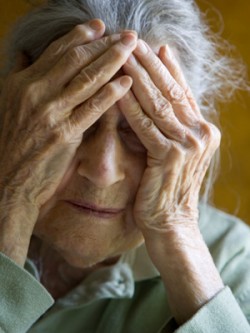Dementia: Other Causes
Dementia is defined as memory impairment along with other defects in cognition. Dementia is a term which indicates any problem related to cognition, judgment, orientation, memory, language and other executive functions of the brain or any syndrome that is associated with the dysfunction of the brain and its activities.
The most common cause of dementia is Alzheimer’s disease. Other causes that frequently cause dementia include head injury, Parkinson’s disease, stroke and various other conditions. Some of these are reversible, while others are permanent and progressive.
There are many times when more than one condition is associated with dementia. When this occurs it is referred to as mixed dementia.
The following types of dementia are included in the DSM-IV:
HIV/AIDS:
 Human immunodeficiency virus, which causes AIDS, is known to destroy and degenerate the normal tissues and structures of the brain thus leading to dementia. In the presence of AIDS, symptoms of dementia include slow gait, delayed speech, forgetfulness and/or a lack of concentrations, delusions, hallucinations and/or apathy. AIDS-related dementia can occur at any age.
Human immunodeficiency virus, which causes AIDS, is known to destroy and degenerate the normal tissues and structures of the brain thus leading to dementia. In the presence of AIDS, symptoms of dementia include slow gait, delayed speech, forgetfulness and/or a lack of concentrations, delusions, hallucinations and/or apathy. AIDS-related dementia can occur at any age.
Huntington’s Disease:
Huntington’s disease affects your movement, cognition and emotion. It is an inherited condition and it typically appears between the ages of 30 and 40, but it can occur at any age. Symptoms typically associated with dementia-related Huntington’s disease are: impaired judgment, memory problems, delusions and/or hallucinations. This disease is progressive and will worsen over time.
Lewy Body Disease:
Lewy body disease occurs when the protein alpha-synuclein is deposited within the cells of your brain. Symptoms commonly associated with this disease include: impaired behavior, perception and thinking, vivid visual hallucinations and/or irregular sleep patterns. If you have dementia-related Lewy body disease, you may experience involuntary movements. The protein alpha-synuclein deposits have found in the brain cells of the people diagnosed with Alzheimer’s and Parkinson’s diseases.
Normal Pressure Hydrocephalus:
An abnormal increase in the level of cerebrospinal fluid within the cavities of your brain leads to the development of normal pressure hydrocephalus. This increased level of CSF exerts an abnormal pressure on your brain and its tissues. The symptoms of the disease typically include: the classical manifestations of dementia and balance problems, a loss of mobility and/or incontinence.
Parkinson’s Disease:
Parkinson’s disease is a neurological defect that affects your mobility. This diseases manifest in the form of rigidity, tremors, balancing problems and impairment of the motor skills. As the disease progresses, it also impairs your cognitive functions resulting in dementia (in some cases). Symptoms of dementia-related Parkinson’s disease include: depression and/or memory loss. The pathology of Parkinson’s disease is similar to that of the Lewy body disease and Alzheimer’s disease.
Pick’s Disease
Pick’s disease is one of the most common causes of dementia. It primarily affects the frontal and temporal portions of your brain. Symptoms commonly associated with this disease include: changes in your personality, a lack of emotion, a lack of empathy and/or a marked deterioration of your social skills. The disease progresses over the course of time and can eventually lead to dementia.
Frontal-Temporal Dementia:
Frontal-temporal dementia occurs when your nerve tissues and nerve cells in the temporal and frontal lobes of your brain degenerate. This disorder appears to run in families and it usually occurs in people ages of 40 and 60 years. If you have this type of dementia, you more than likely have poor judgment skills and social problems such as stealing, compulsive behaviors, overeating, memory loss and/or motor skill problems.
Dementia Due to Creutzfeldt-Jakob’s Disease:
This type of dementia is due to a group of viruses called “prions” or slow viruses. Jacob-Creutzfeldt’s disease is a type of sub-acute spongiform encephalopathies.
Other Hereditary (Rare) Dementias:
These dementias develop in people who are between 50-60 years of age. Typical symptoms are dementia, poor reflexes, hallucinations and/or paralysis. These dementias can lead to a state of coma before dying. In addition, these conditions have also been known as: fatal familial insomnia, British familial dementia and familial Danish dementia.
Secondary Dementias:
Secondary dementias tend to occur in people who suffer from other mobility-related disorders such as multiple sclerosis or Parkinson’s disease. Secondary dementias can also occur due to any of the conditions listed above. They are usually “mixed dementias” meaning they have more than one cause.
Dementias in Children:
Infections, poisoning and/or trauma can lead to the development of dementia. Some forms of dementia only occur in children. These dementias can cause blindness, seizures, loss of motor skills, neuro-degeneration and even death. Most of these conditions are hereditary.
References:
Aids.gov. (n.d.). Dementia. Retrieved from http://aids.gov/hiv-aids-basics/staying-healthy-with-hiv-aids/potential-related-health-problems/dementia/
American Psychiatric Association. (2001).Diagnostic and statistical manual of mental disorders (4th ed). Washington, D.C.
Murphy, M. J. & Cowan, R. L. (2008). Blueprint of psychiatry. Retrieved from http://books.google.ca/books?id=7_7-5dQIpBQC&printsec=frontcover&source=gbs_ge_summary_r&cad=0#v=onepage&q&f=false.
O’Brien, J., Ames, D., McKeith, I. & Chiu, E. (2005). Dementia with Lewy bodies: And Parkinson’s Disease. Retrieved from http://books.google.com/books?id=UZo8Ohd5518C&printsec=frontcover&source=gbs_ge_summary_r&cad=0#v=onepage&q&f=false





